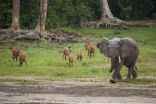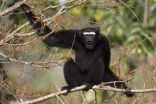(Press-News.org) Washington, DC – Monday, September 29: Between 1970 and 2010 populations of mammals, birds, reptiles, amphibians, and fish around the globe dropped 52 percent, says the 2014 Living Planet Report released today by World Wildlife Fund (WWF). This biodiversity loss occurs disproportionately in low-income countries—and correlates with the increasing resource use of high-income countries.
In addition to the precipitous decline in wildlife populations the report's data point to other warning signs about the overall health of the planet. The amount of carbon in our atmosphere has risen to levels not seen in more than a million years, triggering climate change that is already destabilizing ecosystems. High concentrations of reactive nitrogen are degrading lands, rivers and oceans. Stress on already scarce water supplies is increasing. And more than 60 percent of the essential "services" provided by nature, from our forests to our seas, are in decline.
"We're gradually destroying our planet's ability to support our way of life," said Carter Roberts, president and CEO of WWF. "But we already have the knowledge and tools to avoid the worst predictions. We all live on a finite planet and its time we started acting within those limits."
The Living Planet Report, WWF's biennial flagship publication, measures trends in three major areas:
populations of more than ten thousand vertebrate species;
human ecological footprint, a measure of consumption of goods, greenhouse gas emissions; and
existing biocapacity, the amount of natural resources for producing food, freshwater, and sequestering carbon.
"There is a lot of data in this report and it can seem very overwhelming and complex," said Jon Hoekstra, chief scientist at WWF. "What's not complicated are the clear trends we're seeing -- 39 percent of terrestrial wildlife gone, 39 percent of marine wildlife gone, 76 percent of freshwater wildlife gone – all in the past 40 years."
The report says that the majority of high-income countries are increasingly consuming more per person than the planet can accommodate; maintaining per capita ecological footprints greater than the amount of biocapacity available per person. People in middle- and low-income countries have seen little increase in their per capita footprints over the same time period.
While high-income countries show a 10 percent increase in biodiversity, the rest of the world is seeing dramatic declines. Middle-income countries show 18 percent declines, and low-income countries show 58 percent declines. Latin America shows the biggest decline in biodiversity, with species populations falling by 83 percent.
"High-income countries use five times the ecological resources of low-income countries, but low income countries are suffering the greatest ecosystem losses," said Keya Chatterjee, WWF's senior director of footprint. "In effect, wealthy nations are outsourcing resource depletion."
The report underscores that the declining trends are not inevitable. To achieve globally sustainable development, each country's per capita ecological footprint must be less than the per capita biocapacity available on the planet, while maintaining a decent standard of living.
At the conclusion of the report, WWF recommends the following actions:
Accelerate shift to smarter food and energy production
Reduce ecological footprint through responsible consumption at the personal, corporate and government levels
Value natural capital as a cornerstone of policy and development decisions
INFORMATION:
About World Wildlife Fund
WWF is one of the world's leading conservation organizations, working in 100 countries for over half a century. With the support of almost 5 million members worldwide, WWF is dedicated to delivering science-based solutions to preserve the diversity and abundance of life on Earth, halt the degradation of the environment and combat climate change. Visit http://www.worldwildlife.org to learn more and keep up with the latest conservation news by following @WWFNews on Twitter.
Half of global wildlife lost, says new WWF report
World Wildlife Fund issues 10th edition of 'The Living Planet Report,' a science-based assessment of the planet's health
2014-09-30
ELSE PRESS RELEASES FROM THIS DATE:
Association of physical activity with diabetes is weakest among women at high genetic risk
2014-09-30
New research published in Diabetologia (the journal of the European Association for the Study of Diabetes) suggests that the protective effect of physical activity against diabetes is weakest among those at high genetic risk. The research is by Dr Yann Klimentidis, an Assistant Professor at the University of Arizona Mel and Enid Zuckerman College of Public Health, in Tucson, AZ, USA, and colleagues.
It is well established that physical activity reduces type 2 diabetes risk. However, the extent of protection afforded by physical activity may differ according to genetic ...
Annals of Internal Medicine tip sheet for Sept. 30, 2014
2014-09-30
Prop 46 Physician Drug Testing Mandate May Harm Patients it Aims to Protect
A new California ballot initiative being touted as a patient safety measure may create more problems than it solves, according to two new commentaries being published in Annals of Internal Medicine. Proposition 46, the Medical Malpractice Lawsuits Cap and Drug Testing of Doctors Initiative, would mandate random drug and alcohol testing of physicians and quadruple the cap on medical malpractice awards to $1.1 million. The authors argue that physician drug and alcohol testing should be unrelated ...
Landmark Medicare law had little impact on reducing chemotherapy cost
2014-09-30
WASHINGTON — Legislation passed in 2003 to slow the spiraling costs of drugs paid for by the federal government to treat Medicare patients has had no meaningful impact on cancer chemotherapy drug costs, say a team of researchers in the Journal of Clinical Oncology published online today.
"We looked at use of outpatient chemotherapy to treat colorectal and lung cancers, and did not find a substantial change in how oncologists prescribe those drugs following the implementation of the recent Medicare law in 2005," says the study's senior author, Arnold L. Potosky, PhD, a ...
Plants prepackage beneficial microbes in their seeds
2014-09-30
WASHINGTON, DC – September 29, 2014 -- Plants have a symbiotic relationship with certain bacteria. These 'commensal' bacteria help the pants extract nutrients and defend against invaders – an important step in preventing pathogens from contaminating fruits and vegetables. Now, scientist have discovered that plants may package their commensal bacteria inside of seeds; thus ensuring that sprouting plants are colonized from the beginning. The researchers, from the University of Notre Dame, presented their findings today at the 5th ASM Conference on Beneficial Microbes.
Plants ...
Sweat-eating bacteria may improve skin health
2014-09-30
Bacteria that metabolize ammonia, a major component of sweat, may improve skin health and some day could be used for the treatment of skin disorders, such as acne or chronic wounds. In a study conducted by AOBiome LLC, human volunteers using the bacteria reported better skin condition and appearance compared with a placebo control group. The researchers presented the study results at the 5th ASM Conference on Beneficial Microbes in Washington, DC.
Ammonia-oxidizing bacteria (AOB) are ubiquitous in soil and water and are essential components of the nitrogen cycle and ...
An apple a day could keep obesity away
2014-09-30
PULLMAN, Wash. – Scientists at Washington State University have concluded that nondigestible compounds in apples – specifically, Granny Smith apples – may help prevent disorders associated with obesity. The study, thought to be the first to assess these compounds in apple cultivars grown in the Pacific Northwest, appears in October's print edition of the journal Food Chemistry.
"We know that, in general, apples are a good source of these nondigestible compounds but there are differences in varieties," said food scientist Giuliana Noratto, the study's lead researcher. "Results ...
A 'frenemy' in Parkinson's disease takes to crowdsourcing
2014-09-30
The protein alpha-synuclein is a well-known player in Parkinson's disease and other related neurological conditions, such as dementia with Lewy bodies. Its normal functions, however, have long remained unknown. An enticing mystery, say researchers, who contend that understanding the normal is critical in resolving the abnormal.
Alpha-synuclein typically resides at presynaptic terminals – the communication hubs of neurons where neurotransmitters are released to other neurons. In previous studies, Subhojit Roy, MD, PhD, and colleagues at the University of California, San ...
Radiation risks should be considered and discussed before heart imaging
2014-09-29
Before undergoing heart imaging procedures involving radiation, healthcare providers should help patients understand why the procedure is needed and its potential benefits and risks, including risks related to radiation exposure, according to a new scientific statement in the American Heart Association's journal Circulation.
"With technological improvements, medical imaging has become an increasingly vital tool in diagnosing and treating patients with heart disease, but the rising use of the tests has led to increasing radiation exposure over the past two decades," said ...
Study finds information lacking from FDA on implanted medical devices
2014-09-29
Information is lacking on most implanted medical devices cleared by the U.S. Food and Drug Administration despite a legal requirement that companies submit scientific evidence about the devices' substantial equivalence to other devices already on the market.
Under what is known as the 510(k) review, the FDA clears about 400 implanted medical devices without clinical testing each year for market that are considered moderate to high risk. The FDA has a process that requires the applicant to provide scientific evidence that the new device is "substantially equivalent" ...
AAN: Risks of opioids outweigh benefits for headache, low back pain, other conditions
2014-09-29
MINNEAPOLIS – According to a new position statement from the American Academy of Neurology (AAN), the risk of death, overdose, addiction or serious side effects with prescription opioids outweigh the benefits in chronic, non-cancer conditions such as headache, fibromyalgia and chronic low back pain. The position paper is published in the September 30, 2014, print issue of Neurology®, the medical journal of the American Academy of Neurology.
Opioids, or narcotics, are pain medications including morphine, codeine, oxycodone, methadone, fentanyl, hydrocodone or a combination ...
LAST 30 PRESS RELEASES:
Biochemical parameters in patients with diabetic nephropathy versus individuals with diabetes alone, non-diabetic nephropathy, and healthy controls
Muscular strength and mortality in women ages 63 to 99
Adolescent and young adult requests for medication abortion through online telemedicine
Researchers want a better whiff of plant-based proteins
Pioneering a new generation of lithium battery cathode materials
A Pitt-Johnstown professor found syntax in the warbling duets of wild parrots
Cleaner solar manufacturing could cut global emissions by eight billion tonnes
Safety and efficacy of stereoelectroencephalography-guided resection and responsive neurostimulation in drug-resistant temporal lobe epilepsy
Assessing safety and gender-based variations in cardiac pacemakers and related devices
New study reveals how a key receptor tells apart two nearly identical drug molecules
Parkinson’s disease triggers a hidden shift in how the body produces energy
Eleven genetic variants affect gut microbiome
Study creates most precise map yet of agricultural emissions, charts path to reduce hotspots
When heat flows like water
Study confirms Arctic peatlands are expanding
KRICT develops microfluidic chip for one-step detection of PFAs and other pollutants
How much can an autonomous robotic arm feel like part of the body
Cell and gene therapy across 35 years
Rapid microwave method creates high performance carbon material for carbon dioxide capture
New fluorescent strategy could unlock the hidden life cycle of microplastics inside living organisms
HKUST develops novel calcium-ion battery technology enhancing energy storage efficiency and sustainability
High-risk pregnancy specialists present research on AI models that could predict pregnancy complications
Academic pressure linked to increased risk of depression risk in teens
Beyond the Fitbit: Why your next health tracker might be a button on your shirt
UCSB scientists bottle the sun with liquid battery
Lung cancer drug offers a surprising new treatment against ovarian cancer
When consent meets reality: How young men navigate intimacy
Siemens Healthineers and Mayo Clinic expand strategic collaboration to enhance patient care through advanced technology
Physicists develop new protocol for building photonic graph states
OHSU-led research initiative examines supervised psilocybin
[Press-News.org] Half of global wildlife lost, says new WWF reportWorld Wildlife Fund issues 10th edition of 'The Living Planet Report,' a science-based assessment of the planet's health



